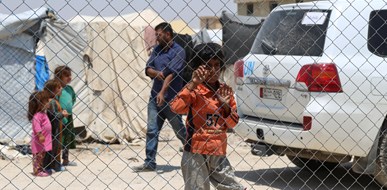[Asser in the media] ‘Security risks can be better managed if the people detained in Syrian camps are repatriated in a controlled manner’
Published 23 November 2021
In a news item on the repatriation of French and other European women and children detained in camps in North East Syria, Asser researcher Christophe Paulussen stresses that the inaction of EU politicians in bringing back former Islamic State fighters and their families leads to greater security risks.
In the article by EURACTIVE, a French delegation that recently met with Kurdish authorities on a mission to North East Syria, calls for an emergency repatriation of children, as winter nears and the living conditions in the camps are ‘catastrophic, due to diseases and a lack of drinking water, very hot summers, very cold winters’.
Apart from the living conditions, which lead to children dying on a daily basis, experts fear that within the Rojava camps, the Islamic State is reconstituting itself, and the children are in “radicalisation hot spots, at the mercy of Daesh.”
Long-term security ramifications
“Many security experts agree that any security risks can be better managed if the people in the camps are repatriated in a controlled manner,” Paulussen, international law expert at the Asser Institute and the International Centre for Counter-Terrorism in The Hague, told EURACTIV. “Nonetheless, there is currently not enough talk about the long-term security ramifications of European governments’ inaction.”
Although in March 2021, the European Parliament called for the reintegration and repatriation of children from Syrian camps, little has been done as governments remain reluctant to repatriate. At the EU level, there is no common policy for dealing with the former fighters, each EU country has its own strategy, mostly on a case-by-case basis. Paulussen points out that this “(…) all boils down to a lack of political will and the inability of politicians to convey to one’s voters what is the only correct thing to do from an international legal, long-term security, humanitarian and moral perspective”.
According to EURACTIV there are an estimated 645 European children and 231 women in Syrian camps. The French delegation called for their government to take action: “Abandoning these children is contrary to French law. The best interests of the child must take precedence over all other considerations”.
Read the full article.
Read more
- [Research paper] ‘Evidentiary and charging matters in the context of prosecuting returning foreign fighters before national courts’
- The repatriation of foreign fighters and their families: options, obligations, morality and long-term thinking
- The long-term risk of non-repatriation of Dutch children in Syrian camps
- Repatriate and prosecute foreign terrorist fighters
- Prosecute ISIS members for war crimes not just terrorism charges, say European prosecutors
- The prosecution of foreign fighters under international humanitarian law: misconceptions and opportunities
Dr Christophe Paulussen is the coordinator of the research strand Human dignity and human security in international and European Law. This research strand adopts as its normative framework a human rights approach to contemporary global challenges, inter alia in the fields of counter-terrorism, especially with regard to the topic of foreign (terrorist) fighters, international and transnational crimes, new technologies and artificial intelligence, and historical memory.
